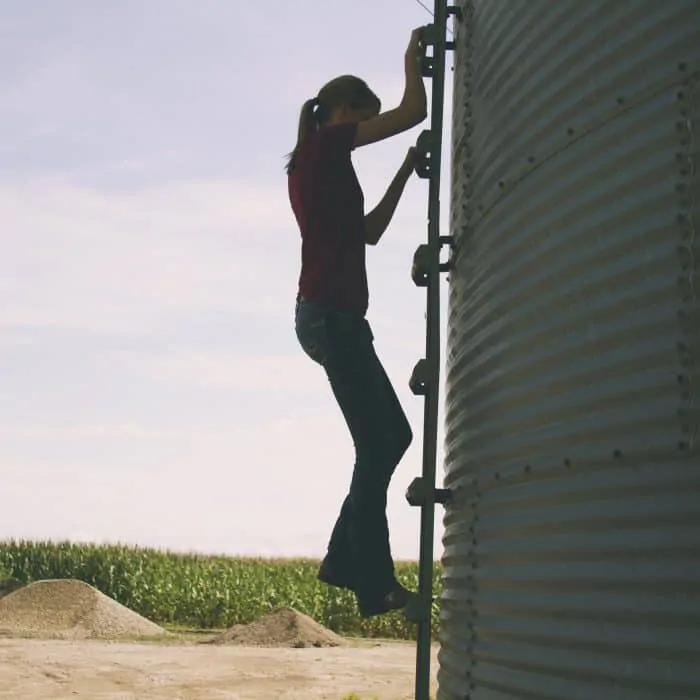Marilyn Adams Talks Farm Safety
She walked into my house and came down to the studio just like any other interview, but this one was different. This one was a mother who sat and told me the unimaginable story of losing her child.
Her 11-year-old son, Keith, suffocated in a gravity flow wagon over 30 years ago and was lost to her forever. As we sat at the table, mother to mother, our eyes locked together as she told me the harrowing details of that dreaded October day back in 1986. She told me about how excited Keith was to finally get to help his dad with the harvest. He even got permission to stay home from school on that fall day.
Marilyn got lost in the story, telling me the details of how they had prepared the night before, making sure Keith went through training to know what to do. They sat on the tailgate of the pickup and watched a falling star. The next morning he was up and out of the house before Marilyn could wish him luck. She thought about calling his Grandma to give him a hug for her while she delivered lunch but didn’t get it done as she was already at work. She regrets that now.
All too quickly her story leaped forward to a call from her friend; a nurse at the doctor’s office. She said Keith had been hurt. Marilyn got a ride to the hospital, convinced when she got there everything would be okay, only, it wasn’t.
At the hospital, she learned that Keith had suffocated in the corn inside of the grain wagon in a situation that she nor her husband could have predicted. It wasn’t even on their radar to worry about. Keith was kept alive for another day on life support before they decided to let him go.
Marilyn readily admits, she fell apart that day. Just listening to her story and feeling a tiny bit of her pain as a mother, I fell apart a little bit inside too. My thoughts immediately jumped to my own 11-year-old and my younger 8-year-old. What would I do? I hope I never have to know.
Farm Safety 4 Just Kids
After a long, long period of grief, the clouds lifted a bit and it became clear to Marilyn that if she wasn’t aware of the dangers of grain entrapment then other families like hers weren’t either. She started to look for some data, some numbers around these types of accidents and surprisingly there wasn’t any. So, she set about to change that.
Marilyn formed the non-profit Farm Safety 4 Just Kids. They created educational programs aimed at teaching kids and their families about the dangers on the farm. Kids who by their nature and their life on the farm are thrust into situations that could compromise any adult.
Marilyn spent the next three decades working to reduce the number of accidents like the one that took Keith’s life. She was successful in not only reducing the number of accidents drastically but also in sparking an industry awareness and a more widespread network of safety programs focused on the farm.
Thirty years, thousands of chapters and hundreds of thousands of affected kids later she decided her job was done and FS4JK closed its doors in 2016, donating the rest of their funds to 4H and FFA and turning their programming over to the Progressive Agriculture Foundation who is continuing her good work, today.

At the end of our conversation, we had a shared broken heart and a pile of wet tissues. It’s not an easy story to hear, and her gentle and kind nature somehow pulled me further into the dramatic turn of events, let me picture it almost as if I was living it.
Throughout the conversation, there was a consistent message and that is 100% of these types of accidents are avoidable. You heard that right, 100%. Knowledge and caution are the keys.
Marilyn also wanted to leave everyone with one last message, and that is, it’s OK as the parent to say no. If you don’t feel comfortable with a situation or you feel uneasy about something your child is doing, you can say no. You can and should speak up. It just might make the difference of a lifetime.

Silo – Film About Farm Safety
Now, let’s rewind a few years ago when I was contacted by a New York film producer named Sam Goldberg. Sam was reaching out, trying to create a network and weave his way into the agriculture community over a film that he was working to produce. It was a film about grain entrapment.
Through a series of events Sam had become aware of a story about grain entrapment and had decided it was a story that needed to be told. He started out with a short film. I watched it. It was dramatic and real and had my attention.
Knowing that it is our job to spread the safety message far and wide, we stayed in touch and I watched from afar as he found that network and resources to get the full-length film made. I finally caught up with Sam in Iowa at a farm show and had the chance to talk in person about his experience and drive in making the film.
Creating an independent film as he did is, much like farming, a true labor of love. There isn’t a budget to do what you need. You have to be resourceful. You have to be passionate about it…and often care way more than you really should. Sam is passionate and in watching the film that night amongst a group of farmers and industry people, I could feel that passion come through on the screen.
It’s real, raw and at times downright scary. The film is dramatic in an unsuspecting way, showing what happens in a community when a young boy is entrapped in grain. It details the efforts to rescue him. Sam and his team nailed it. It’s worth your time to seek out a location to watch the film (you can do that here), and if there isn’t a showing near you, be the person who spreads the message and talk to Sam about how to get a screening in your community.

Grain Entrapments Are 100% Preventable
At the end of the day, I want to reiterate what Marilyn so poignantly said. 100% of grain entrapment deaths are preventable….100%.
Start the conversation on your farm, in your workplace, with your family or with your Co-Op today. Enquire with your local fire department about their training and equipment to see if they are prepared if a rescue is needed in your community. If they aren’t, nominate them today via Nationwide’s Grain Bin Safety program which awards fire departments around the country with $5,000 worth of training and equipment to be better prepared when this situation arises. Make the nomination by clicking here, it might just be the best few minutes you could ever spend.
Everybody Eats
Find More Stories at Everybody Eats
We all eat, and that is why farming will always matter. Everybody Eats is where the stories of food and farming intersect.
These stories told through my FarmHer lens connect us to our food and more importantly, the people behind it.
Everybody Eats is a collection of stories of those who protect our rural communities, who grow our food with extraordinary care, and who provide support, education, and assistance to make sure Everybody Eats.



It’s interesting to know that a dedicated silo would be needed in order to have a working grain handling system. My uncle is quite adept at cultivating lettuce, tomatoes, and eggplant but he plans to expand into grains soon. I think some massive changes will to be done in his farm to accommodate for that.
I’m glad you talked about the importance of following safety regulations when it comes to gran handling. Recently, one of my cousins mentioned he’s interested in building a farm in his family’s land. My cousin wants to harvest grains, store them, and sell them, so I’ll be sure to share your advice with him. Thanks for helping us understand the dangers of neglecting grain handling safety.